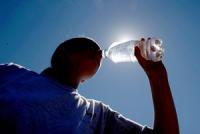-
Italians Decided to Fight a Conspiracy Theory. Here's What Happened Next.
Alongside the flat-earthers, 9/11 truthers and Obama birthers, the anti-vaccine conspiracy theorists have always had a special distinction: They can do immediate and specific damage in a way that the others can’t. Birtherism surely increased Americans’ distrust of politics, though in ways that are hard to pin down. By contrast, when anti-vaxxers persuade parents not to vaccinate children, the result can be sickness and even death.
-
-
Humanity’s Ability to Feed Itself Under Growing Threat
A new UN report warns that the world’s land and water resources are being exploited at “unprecedented rates,” and that the combination of this increasingly more rapid exploitation with climate change is putting dire – and threatening — pressure on the ability of mankind to feed itself.
-
-
Yes, Flesh-Eating Bacteria Are in the Warm Coastal Waters – but it doesn’t mean you’ll get sick
News reports about flesh-eating bacteria — V. vulnificus —tend to focus on people dying or losing limbs from the bacteria. It’s not front-page news when someone has a mild skin infection or eats a bad oyster and spends a couple days in the bathroom. We don’t often identify the most mild illnesses because people typically don’t seek medical care for them. Even so, V. vulnificus infections are rare. The Centers for Disease Control and Prevention estimates that about 205 infections occur each year, of which 124 were reported in 2014, including 21 deaths.
-
-
Nuclear Power Offers an Abundant Supply of Low-Carbon Energy. But What to Do With the Deadly Radioactive Waste?
The dilemma of how to manage nuclear waste — radioactive materials routinely produced in large quantities at every stage of nuclear power production, from uranium mining and enrichment to reactor operation and the reprocessing of spent fuel — has taxed the industry, academics and governments for decades. Along with accidents, it has been a major reason for continuing public opposition to the industry’s further expansion despite substantial interest in nuclear power’s status as a low-carbon power source that can help mitigate climate change. The race is on to develop new strategies for permanently storing some of the most dangerous materials on the planet.
-
-
Bashar al-Assad’s Updated, Sinister Version of Biological Warfare
Biological warfare is generally understood as the deliberate wartime introduction of a lethal pathogen with the intent to kill or maim. Syria under President Bashar al-Assad is pursuing a sinister variation—one with long and dangerous historical precedents. Assad’s government has allowed pathogens normally controlled by public health measures—such as clean water, sanitation, waste disposal, vaccination, and infection control—to emerge as biological weapons through the deliberate destruction and withholding of those measures. The conflict has in effect reversed public health advances to achieve levels of disease not seen since the Napoleonic era.
-
-
460,000 Premature Deaths: The Horror That Was Nuclear Weapons Testing
In March 1954, over the Bikini Atoll, the United States detonated a 15-megaton hydrogen bomb —one thousand times more powerful than the bomb that destroyed Hiroshima. It was the largest explosion ever set off by Americans, and also the dirtiest. Researchers have now found that, more than sixty years after the nuclear tests the United States conducted in the area, the levels of radiation in several Marshall Island atolls, exceed that found at Chernobyl or Fukushima. The United States also detonated hundreds of atomic bombs in Nevada, and a 2017 study suggested that fallout from the Nevada nuclear testing could have led to between 340,000 and 460,000 premature deaths, mostly Americans and mainly through cancer.
-
-
No, Lyme Disease Is Not an Escaped Military Bioweapon, Despite What Conspiracy Theorists Say
Could Lyme disease in the U.S. be the result of an accidental release from a secret bioweapons experiment? Could the military have specifically engineered the Lyme disease bacterium to be more insidious and destructive – and then let it somehow escape the lab and spread in nature? Is this why 300,000 Americans are diagnosed annually with this potentially debilitating disease? It’s an old conspiracy theory currently enjoying a resurgence with lots of sensational headlines and tweets. Even Congress has ordered that the Pentagon must reveal whether it weaponized ticks. And it’s not true.
-
-
Missile Strike False Alarm Most Stressful for Less Anxious Hawaiians: Study
After learning that a warning of a missile headed to Hawaii was a false alarm, the most anxious local Twitter users calmed down more quickly than less anxious users, according to a study of tweets before, during and after the event. “Can a false alarm of an impending disaster itself be a form of trauma? Our results suggest that the experience may have a lingering impact on some individuals well after the threat is dispelled,” says an expert.
-
-
Epigenetic Tool for Detecting Exposure to WMD
With a $38.8 million award from DARPA, researchers are working on developing a field-deployable, point-of-care device that will determine in 30 minutes or less whether a person has been exposed to weapons of mass destruction or their precursors. The device will be capable of detecting the health effects of a number of substances associated with weapons of mass destruction, including biological agents, radiation, chemicals and explosives. The detection devices will scan potential exposure victims for epigenetic changes, that is, chemical modifications that affect genes, altering their expression while leaving the genetic code intact.
-
-
40 U.S. Diplomats in Cuba Have Suffered Brain Damage: Medical Report

Brain imaging of 40 U.S. government personnel who served at the U.S. embassy in Havana in 2016, and who experienced a host of neurological symptoms after possible exposure of an unknown source, revealed significant differences in brain tissue and connectivity when compared to healthy individuals, according to a new report. Images reveal key brain differences, particularly in the cerebellum, between impacted patients and healthy individuals, which may underlie clinical findings previously reported by brain experts.
-
-
American Nurses Not Prepared for a Catastrophe: Study
On average, American colleges and universities with nursing programs offer about one hour of instruction in handling catastrophic situations such as nuclear events, pandemics, or water contamination crises, according to two recent studies. “We are putting people out there to attend these emergencies, and we owe it to them to prepare them right,” says one expert.
-
-
The Challenge: Feeding 11 billion People Without Spread Infectious Disease

Within the next 80 years, the world’s population is expected to top 11 billion, creating a rise in global food demand — and presenting an unavoidable challenge to food production and distribution. But a new study describes how the increase in population and the need to feed everyone will also, ultimately, give rise to human infectious disease, a situation the authors of the paper consider “two of the most formidable ecological and public health challenges of the 21st century.
-
-
Dangerous Heat Wave Is Building in the Central and Eastern U.S.

The National Weather Service said Thursday that an upper-level ridge is building over the southeastern U.S., setting the stage for what will be a miserably hot and humid weekend for millions of Americans. Heat advisories and warnings affect 154 million Americans. In many major population centers, the heat index is forecast to peak around 110 degrees between Friday and Sunday.
-
-
These Hackers Made an App That Kills to Prove a Point
Two years ago, researchers Billy Rios and Jonathan Butts discovered disturbing vulnerabilities in Medtronic’s popular MiniMed and MiniMed Paradigm insulin pump lines. An attacker could remotely target these pumps to withhold insulin from patients, or to trigger a potentially lethal overdose. And yet months of negotiations with Medtronic and regulators to implement a fix proved fruitless. So the researchers resorted to drastic measures. They built an Android app that could use the flaws to kill people.
-
-
WHO Declares Ebola Outbreak in Congo an Emergency of “International Concern”
The UN’s World Health Organization (WHO) on Wednesday declared the Ebola outbreak in the Democratic Republic of Congo a “public health emergency of international concern.” “It is a measure that recognizes the possible increased national and regional risks and the need for intensified and coordinated action to manage them,” said the WHO in a statement.
-
More headlines
The long view
Global Anxiety and the Security Dimension: From Personal Despair to Political Violence
Uncertainty and despair—born of economic insecurity, social isolation, and widening inequality—have fueled a striking surge in anxiety across the United States. But this mental-health crisis is not confined by borders.
The Silent Epidemic: America’s Growing Anxiety Crisis
Anxiety—once dismissed as mere nerves or a passing phase—has become one of the most prevalent and debilitating public health issues facing Americans today. how did we get here—and what do we do now?
